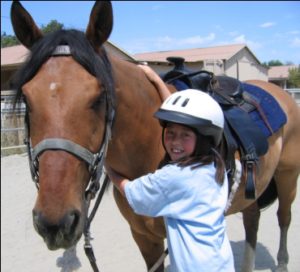 Horses: What majestic, elegant creatures of beauty and grace. And in thundering herds, what power and strength. To be able to communicate with a horse eye-to-eye and with a whisper, using only slight movements to direct motion, demonstrates a gift of true mutual trust. Now, imagine being a child who has had more than their share of problems or hardships, looking up at a large horse and being able develop that relationship and mastery. Talk about a confidence builder!
Horses: What majestic, elegant creatures of beauty and grace. And in thundering herds, what power and strength. To be able to communicate with a horse eye-to-eye and with a whisper, using only slight movements to direct motion, demonstrates a gift of true mutual trust. Now, imagine being a child who has had more than their share of problems or hardships, looking up at a large horse and being able develop that relationship and mastery. Talk about a confidence builder!
Okay—a Horse Whisperer is technically “a horse trainer who adopts a sympathetic view of the motives, needs, and desires of the horse, based on modern equine psychology”. It takes years of experience to attain that level of expertise, and we all know that is beyond the scope of a young child. Perhaps the terms “friend, buddy or pal” are more appropriate. In any event, learning to bond with a horse comes with lasting life lessons.
There is a place where kids are experiencing that important outcome: Victory Ranch, Inc. in San Jose, California works with kids 8 to 16 years old to help them grow and develop life skills. These are neglected or abused kids, some suffering from depression or addiction, perhaps from broken homes or live in foster care. Some are kids who could use a helping hand and some positive goodness to keep them out of the juvenile justice system. In general, the emphasis is working with disadvantaged, under-served, at-risk, neglected, abused, and low-income youth, that include foster, adopted, and siblings of kids with life-threatening illnesses. Oh, did I mention—there’s no charge for the kids participating in the program?
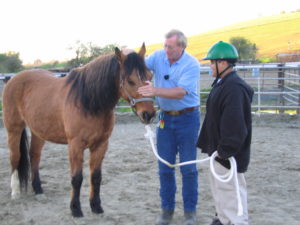 Doug Hutten founded Victory Ranch, Inc. in 2006. He started riding horses at age 6, and his adult equestrian experience spans over forty years which includes avid trail riding, competing, stable management, training, volunteering with special needs organizations, writing for Western Horseman Magazine, working with various equestrian Search & Rescue Teams in two states, organizing and managing a PRCA-sanctioned event, and Charity-Celebrity Trail Rides. In other words, he knows his way around horses.
Doug Hutten founded Victory Ranch, Inc. in 2006. He started riding horses at age 6, and his adult equestrian experience spans over forty years which includes avid trail riding, competing, stable management, training, volunteering with special needs organizations, writing for Western Horseman Magazine, working with various equestrian Search & Rescue Teams in two states, organizing and managing a PRCA-sanctioned event, and Charity-Celebrity Trail Rides. In other words, he knows his way around horses.
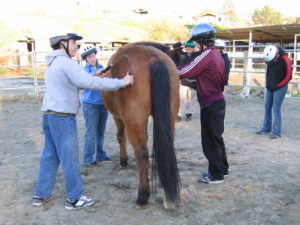
He has been involved numerous Horseman Associations and charitable organizations for a long time, giving back to those who need assistance. When he witnessed the great number of troubled kids in the Bay Area, he put his knowledge of horses into focus, and knew he could put the two together to create positive behavior changes. Doug realized that kids talk to dogs; if he could get them to feel safe and open up by talking with horses, only good would come of it. He was right.
One success story is Nick Campbell, now 20 and a student at UC Davis. He was just going into high school in 2009 with a lot of extracurricular time on his hands when he entered the program. “My main job was to help muck out the stalls, groom the horses (and bathe them when the weather permitted), exercise them and keep them in practice with Doug’s style of horse training. It’s very important to be constantly making sure that they know their roles and how to behave on the ground, as well as while being ridden.”
The Kids & Horses Education Program (KHEP) is a 5-week after-school and weekend education program which creates positive behavioral changes in almost every child enrolled. Participants engage in tasks with horses that are fun and facilitate communication and teamwork. The horses themselves encourage cooperation and creative thinking, and are capable, sentient mental health team members providing non-judgmental feedback to the kids.
The staff members are certified in utilizing horses in therapy, and when a child needs special help, the Ranch also offers Equine Assisted Psychotherapy (EAP) utilizing qualified mental health/clinical professionals. The kids are continually monitored by staff who employ program evaluation, questionnaires, and applied observational field research to help measure their progress.
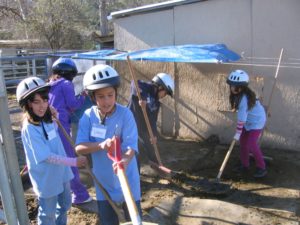 Does it work? Oh, yeah, and very well. Kids learn that they can influence something larger than themselves in a positive way, making them feel better about themselves. The conclusions validate that the goals of the KHEP Program (improved life skills – self-confidence, team work, social skills, personal achievement, focus/follow directions, communication skills, and knowledge of horses) are improved/achieved in the majority of students.
Does it work? Oh, yeah, and very well. Kids learn that they can influence something larger than themselves in a positive way, making them feel better about themselves. The conclusions validate that the goals of the KHEP Program (improved life skills – self-confidence, team work, social skills, personal achievement, focus/follow directions, communication skills, and knowledge of horses) are improved/achieved in the majority of students.
As Nick says, “I became a much harder worker because of VR, and a lot better at time management.”
And when a child graduates from the program with a certificate, they are designated “Buckaroos” (467 total graduates to date) and are invited to return to help mentor the younger first-time participants in future sessions. Not only is it fun to help out, but the positive messages are reinforced while developing leadership skills.
Returning as a Buckaroo, Nick recounts, “During the programs for the foster children, my job was to support Doug and Pat as a kind of teaching aide. I had gone through the program as an observer, so I knew the structure. I helped teach the skills the program tries to impart to the kids, and made sure that everyone was kept in the group. The kids were not allowed to be with the horses by themselves, a volunteer or leader had to be with them at all times, especially when they got to be on the horses.”
What’s next for Victory Ranch? With as many children in the Bay Area who really need the kind of positive help the Ranch provides, the natural course is to increase the number of sessions to accommodate as many as they can. They also want to start a program for the Horsemanship Merit Badge for the Boy Scouts, Varsity Scouts and Venturers. And then there’s the planned expansion into the critical need of serving returning Veterans suffering PTSD. By mirroring the efforts and success they’ve had with the children, translating the horse therapy to the Veterans is sure to have a profound effect.
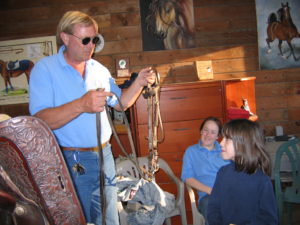
Would Nick Campbell recommend Victory Ranch to parents of deserving kids? “Definitely, seeing the way that shy, reserved kids start the program and end up with friends and skills that allow them to be social is amazing. A lot of the kids can’t work in group because of shyness or anxiety in the beginning, but they really open up through working with the horses and with other kids in their situations.”
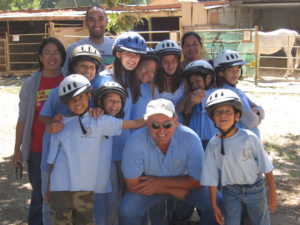 Of course operating as a non-profit, funding the Victory Ranch programs has always been challenging. Fortunately several foundations and corporate sponsors of note have seen the benefits their support has made (see the website for their list). An endeavor that includes 23 staff and board members (mostly volunteers), the need is constant to make sure that there are enough funds available to feed the horses, pay the rent and provide the free service they do so well. And to ‘take it to the next level’ with additional services, fundraising activities takes a bit of their time and attention. You can learn more about Victory Ranch by visiting the website. If you can help the Buckeroos in any way, I’m sure they would appreciate your interest.
Of course operating as a non-profit, funding the Victory Ranch programs has always been challenging. Fortunately several foundations and corporate sponsors of note have seen the benefits their support has made (see the website for their list). An endeavor that includes 23 staff and board members (mostly volunteers), the need is constant to make sure that there are enough funds available to feed the horses, pay the rent and provide the free service they do so well. And to ‘take it to the next level’ with additional services, fundraising activities takes a bit of their time and attention. You can learn more about Victory Ranch by visiting the website. If you can help the Buckeroos in any way, I’m sure they would appreciate your interest.
By the way, although they call the graduates “Buckaroos” I prefer the term “Horse Whisperers”. It better demonstrates the magic that happens at Victory Ranch.